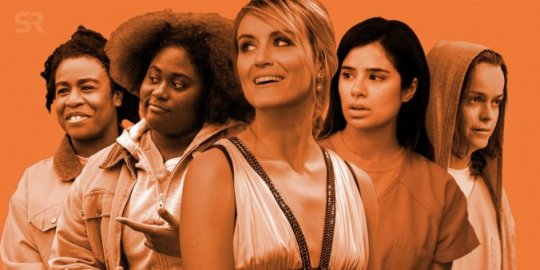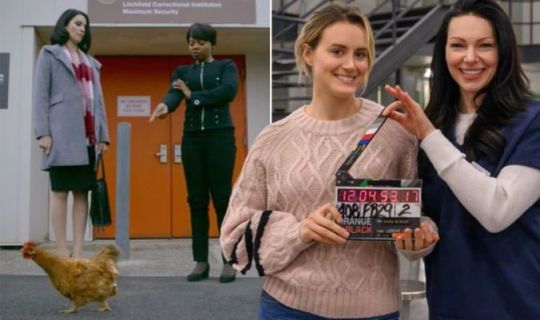#soso glad i found the show and was introduced to so many lovely people here on tumblr dot com
Explore tagged Tumblr posts
Text
TEN YEARS OF LOCKWOOD AND CO AND I ONLY FOUND THEM THIS JANUARY
#truly WILD to think that i haven't been here for YEARS#soso glad i found the show and was introduced to so many lovely people here on tumblr dot com#this place really feels like a family and i wouldn't have it any other way <333 love you all!!#lockwood and co#lockwood & co#happy anniversary l&co
75 notes
·
View notes
Text

ORANGE IS THE NEW BLACK: The Final Season. Netflix. (Credit: Screenrant)
My oh my. What a journey these past seven years have been with Orange Is The New Black. And if you’re anything like me, you’ve been watching this show for the past seven years, and looking back at everything you’ve seen this show do, it just overwhelms you with all kinds of feelings.
I don’t tend to watch a lot of TV as committing to shows and the time and getting hooked onto something isn’t really in me, but Orange was the first show I ever watched on Netflix before Netflix really became what it was (as one of the first-ever Netflix original series made during a time people didn’t really know what Netflix was, giving roles to women, showcasing women’s stories and providing an intriguing setting at a women’s prison released during my slow college summer days, yeah, OITNB really stuck).
If you’ve managed to finish watching the final season, read on ahead if you don’t care for any potential spoilers.

OITNB was truly revolutionary. When it introduced us to Piper Chapman in its first season — an upper-middle-class white blonde entering prison — little did we know that she was just a “Trojan horse” to tell the stories of women who rarely get told: women of color, immigrant women, queer women, poverty-stricken women, women with addictions, mental illnesses, disabilities, etc. OITNB was a true pioneer in the way it told these very important, very under shadowed stories, and left us with some of its best episodes to date in its final season.
The main thing that has been OITNB‘s driving force is its ability to humanize characters
… characters we may have grown to hate or dislike simply because of their behaviors and actions with the characters we loved in the prison world. The flashbacks helped give us context as to why people are the way they are (it made early characters like Pornstache seem even lovable), which is something that is important and something we all should realize.
These women are women just like us. They have become a product of the system we are all placed into, and perhaps they lost their way. They found themselves at the wrong place at the wrong time, or got caught up in something seedy just for the sake of trying to survive.
In season seven, Tamika (Susan Hayward), an old friend of Taystee’s (Danielle Brooks) who became a prison guard at the same prison Taystee was incarcerated at, loses her job as warden at Litchfield — a job she got to become a “scapegoat” for black women and diversity for the uppers in the system, but a job she ended up proving to be terrific at, as she implemented programs to try and help make the prison a better place for the women. Taystee even started tutoring other inmates to pass their GED test.
When Tamika gets fired, she says she’s relieved, because no matter what good she or others may continue to do, “The system will always be what it is, and there’s not a damn thing I can do.” (That is one hell of a line.)
OITNB did a great job of highlighting and revealing the problems in our system — and how undeniably unfair they can be.
No matter what you do or how good you can try to be, the system always feels against you, and you feel helpless. In the case of Taystee, the systems of oppression became too much and almost impossible to fight or dismantle (even Mr. Caputo and the villainous Fig have tried their best to bring justice to the prison). A life sentence in prison for Taystee can make you question why you should even continue to try or fight, as you reason that ending your life is the only way out.
One of the most heartbreaking moments came in the form of Pennsatucky. She’s been there since season one and become one of the most lovable rednecks the shows ever had. She’s got a good heart, is widely misunderstood, and only wants the best for others and for herself. Her learning disability may hit home to so many people, and the fact that she did pass her GED, all thanks to Taystee, only to find that out after Pennsatucky lost her life… That was an immediate tearjerker. And a real loss that doesn’t sugarcoat anything. (Ugh.)
One of the storylines I really loved this season was the relationship Nicky (Natasha Lyonne) found with Shani Abboud (Marie Lou Nahhas) in the immigration detention center. For such a brief character in the whole of the series, Shani’s story was so telling, riveting and important. Her story of deportation, but also of female genital mutilation within the Muslim culture, was so revealing. I’m glad shows like OITNB exist to shine a light on these issues and cultural differences that do in fact exist, but never see the light of day. Her presence was refreshing, and we got to see so many layers come to light of Nicky as well, for how broken she is but how much of a heart she has for everyone around her. (And I have to add, I’ve got such a girl crush on Shani, as straight as I am, ha!)
There are so many layers to this series, but as Piper has always been the one that tied the whole series together, we can’t help but feel and relate to her. (After all, most of this shows viewers might relate to the white liberal that is Piper?) As she gets released from Litchfield and transitions into everyday life, the struggles of that life out of prison become so real. Paying rent, finding a job, keeping up with your probation, and trying to stay out of trouble? Taystee made that very clear (and so did many of the other inmates) as they found their way back into prison, after being released, and it all just becomes one huge circle and cycle that repeats itself (for Aleida, “I’ve got people in there, and I’ve got nobody out here,” is so telling).
Piper’s moment with Larry when he laid it all out on her — for who he thinks she is, and read her and her actions like a book (as someone who has had her whole life laid out in front of her, this perfect, beautiful life, but one day maybe meant nothing to her, as she craved something different, which she found through Alex, and that drama continues to fuel her, even when she’s got this perfect woman in the form of Zelda in front of her) — was just so incredibly telling. (I fearfully might be able to relate to Piper in this case, quite frankly…)
We begin to know ourselves and our relationships better through these characters, and as these characters get tested, we see what drives characters to do what they do, which makes this series so damn compelling. It’s a series that has always been about everyone else but Piper, and we can all relate to it.
This series has opened up so many conversations over the years, and when it started in 2013, it began to highlight pressing topics during its run. The Black Lives Matter movement was at an all-time high when we saw the death of Poussey (Samira Wiley), due to an untrained guard trying to stop a fight he thought she was engaging in, only to accidentally suffocate her to her death. Then came the prison riots and the unjust f**ked up system that goes into saving the upperhands’ lives and and reputations at the sake of the inmates.
Although season seven as a whole seemed to be its most focused yet, with each episode and every scene serving up some hell of moments, powerful scenes, damn funny moments and the humor you find in these women who find happiness while even in the sh*ttiest of circumstances… I think that’s what this show’s all about.
Life will always throw you curveballs and tough moments, and it’ll never get any easier, as the system will always work against you and out of your favor, but, you can find happiness. You can find joy in the little everyday moments and find your life’s purpose and make someone’s day that much better.
All of the exits in this show were so beautifully raw, painful, unfair and real. The deportation of poor Maritza (Diane Guerrero), who had grown up in the U.S. her entire life, just felt so unfair! And while I had wished to see more of the other inmates’ stories whom we had fallen in love with over the years, such as Soso, Big Boo, Yoga Jones, and all the others in the Columbus, OH prison, this show seemed to do its part (I’d hope someday they’ll continue these stories of the other women). The last 20 minutes of the last episode felt a little rushed to get all the cameos of the other women in, but, understandably so, it was still a lovely send-off.
There’s not much else I can say at the moment, but I think for anyone who’s watched this show knows the great impact its had. Thank you, Orange, for what you’ve done and given us, and all the conversations you’ve sparked and platforms given for so many viewers and women over the years.
Orange, forever. 🧡
youtube
Have you watched the final season? Do you watch OITNB? If so, I’d love to know your thoughts on the season or series as a whole!
My Thoughts After 7 Years of ‘Orange is the New Black’ My oh my. What a journey these past seven years have been with Orange Is The New Black…
#Aleida#Alex Vause#Danielle Brooks#Diane Guerrero#Farewell Season#Farewell Show#Federal Prison#Finale#Flaritza#ICE#Immigration#Jackie Cruz#Jenji Kohan#Laura Prepon#Natasha Lyonne#Netflix#Nicky Nichols#OITNB#Orange Forever#Orange Is The New Black#OrangeForever#Pennsatucky#Piper#Piper Chapman#Prison#Season 7#Selenis Leyva#Shani#Shani Abboud#Susan Hayward
1 note
·
View note